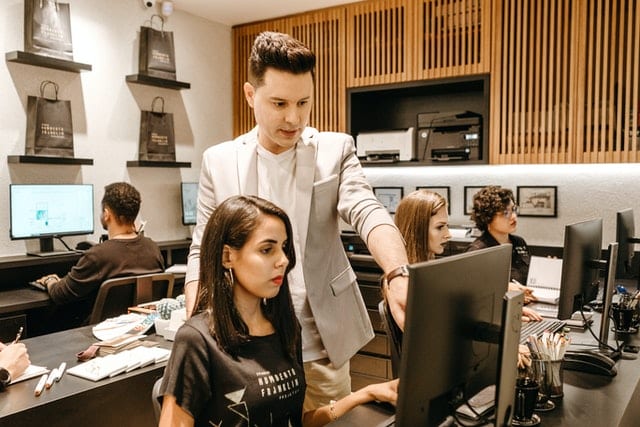Do you know that good communication is vital to successful relationships in your personal life and at work?
While your answer may be a YES, you may ask yourself if your communication skills are up to par.
Don’t worry if that’s the case!
In this blog post, you’ll learn five essential communication skills to help you become a better communicator. So, whether you’re looking to improve your relationships, advance in your career, or become a more effective speaker, these skills are a must-have in today’s world.
Also, it doesn’t matter whether you want to learn how to talk to your spouse, boss, or colleagues. You sure can do that.
According to a survey by LinkedIn, communication is one of the top soft skills employers look for in candidates.
Of course, good communication skills can help you build rapport with others and convey your ideas. Plus, allow you navigate difficult conversations without stress.
But before we look at these essential skills you need to hone your communication abilities, let’s look at:
What are the 5 Importance of Communication?
When you become good at communication, you attract success into your personal and professional life. But, there are 5 benefits of communication you should know. They include relationship building, conflict resolution, information sharing, decision-making, and goal realization.
A brief explanation of the 5 importance of communication
1. Building relationships
Communication enables individuals to express their thoughts and emotions and actively listen to others. Plus, effective collaboration with their teams towards common goals.
In other words, through it, you connect with others, build trust, and establish stronger relationships.
2. Resolving Conflicts
When you learn and master how to communicate effectively, you can avoid misunderstandings and clear up any confusion. As you find mutually acceptable solutions.
In other words, communication is essential for resolving conflicts and disagreements without causing serious strains on your relationships.
4. Sharing Information
Another importance of communication allows you to share information and knowledge with others. And that makes it vital in both your personal and professional settings.
Also, by sharing our ideas and expertise, we can learn from each other and make better decisions.
5. Making Decisions
Again, effective communication helps you as an individual or as a team member to make sound decisions.
Of course, through it, you can gather information and then consider different perspectives. Ultimately, it helps you make well-informed decisions
Bonus Point: Allow You Achieve Your goals
Finally, communication is an essential tool for achieving your personal and professional goals.
Your goal could be to persuade someone to support your ideas or negotiate a deal. Or to lead a team toward achieving a common goal.
What are 5 Good Communication skills?
When you develop these skills, you achieve improved relationships and your goals.
#1. Active Listening
Active listening skills are essential for effective communication, making it one of the five core communication skills anyone can have.
It’s all about giving your undivided attention to the speaker and responding to their message. Through your body language also, not only with words.
So, active listening involves concentration, attentiveness, and responsiveness to the speaker’s message.
Here are some tips on how to improve your active listening skills:
-
Maintain eye contact and avoid distractions.
-
Give the speaker your undivided attention without interrupting or imposing your views.
-
Use nonverbal cues like nodding, smiling, and leaning forward to show your engagement.
-
Ask open-ended questions to encourage the speaker to expand on their ideas.
-
Summarize or paraphrase the speaker’s message to show that you understand.
-
Avoid judgment, criticism, or defensiveness, even if you disagree with the speaker.
-
Provide feedback to clarify or confirm your understanding.
#2. Clarity in Messaging
Also, being clear and concise in your messaging is one of the essential communication skills anyone can master. Of course, it’s all about presenting information in a way that is easy to understand, regardless of the context.
So, whether you’re speaking to a friend, colleague, or client, clarity in messaging is crucial.
One practical example is organizing your thoughts and ideas into a concise format. By doing so, you can avoid confusion and ensure your message gets conveyed so well.
Here are tips you can apply to improve your clarity in messaging:
-
Use simple language and avoid jargon or technical terms.
-
Organize your thoughts and ideas before communicating.
-
Break your complex ideas into smaller, more manageable pieces.
-
Use visuals, such as graphs or diagrams, to illustrate key points.
-
Ensure that the tone of your message is appropriate to the audience and the situation.
-
Confirm your listener or audience got and understood your message.
-
Clarify any misunderstandings and address any questions or concerns.
#3. Nonverbal Communication
Another essential communication skill you should develop is nonverbal communication. Not only is it a vital component of effective communication. Nonverbal communication is one of the five core communication skills that anyone can have.
According to a study by a renowned communication psychologist, Albert Mehrabian:
So, a practical example of nonverbal communication during a conversation is maintaining appropriate eye contact and body posture.
That said, you can apply the practical tips below to improve nonverbal communication:
-
Use appropriate facial expressions, like smiling or nodding, to convey engagement and interest.
-
Maintain appropriate eye contact, but avoid excessive staring or looking away.
-
Use appropriate gestures and body language to support the message you intend to convey.
-
Adjust tone and volume to match the situation and the message.
-
Avoid distracting or fidgeting movements, such as tapping fingers or shuffling feet.
-
-
Pay attention to nonverbal cues from the other person to ensure they received the message accurately.
#4. Empathy
Empathy is a powerful communication skill that can help individuals build stronger relationships and foster better understanding between people. As it’s all about stepping into someone else’s shoes to see things from their perspective and understand their feelings.
One practical example of empathy in action is when you actively listen to someone going through a tough time, offering them your support and understanding.
Through that, you create a sense of connection and trust. And in turn, that strengthens your relationship and helps others feel heard and valued.
So, as one who wants to become a better communicator, you can start by practicing empathy. You’ll be amazed to see how it can transform your interactions with others.
The points below are practical tips to become more empathetic in communication:
-
Practice active listening to others and show interest in their feelings and concerns.
-
Attempt to view things from the standpoint of the other individual and comprehend their perspective.
-
Show genuine interest and compassion for others.
-
Avoid judging or criticizing others’ feelings or experiences.
-
Provide help and motivation to individuals who are facing challenges.
-
Show understanding using active listening skills, such as summarizing or paraphrasing.
-
Practice self-reflection and consider how your actions and words affect others.
#5. Flexibility
In this context, flexibility means the ability to adjust your communication style. So you can meet the needs and preferences of your audience.
Because only then can you navigate through changing situations. While you respond to different communication styles pretty well. For example, when speaking to someone who prefers direct communication, you can adapt using clear and concise language.
So, if you’re speaking to someone who prefers a more conversational approach, you can adjust, using a more relaxed and informal tone.
In other words, being flexible in your communication style, you can ensure people receive your message well. So, don’t be afraid to switch it up and adapt to your audience’s needs!
To improve flexibility, here are some practical and easy tips you can follow:
-
Be open-minded and willing to consider different perspectives.
-
Adapt communication style to match the needs of the audience.
-
Be ready to change plans or adjust course if necessary.
-
Be comfortable with ambiguity and uncertainty.
-
Be adaptable in the face of unexpected challenges or obstacles.
-
Stay calm and composed in high-pressure situations.
-
Be proactive in seeking feedback and making improvements.
Final Thoughts
Mastering the five core communication skills can help you become an effective communicator. Through them, you build stronger relationships, and achieve your goals.
That’s because communication is a vital aspect of our personal and professional lives.
Again, these communication skills include clear messaging, empathy, nonverbal communication, flexibility, and active listening.
And as said earlier, you don’t need to worry because these skills can get developed and improved with practice.
So, you should follow the practical examples and bulleted points outlined in this blog post. That way, you can improve your communication skills. And, of course, boost your confidence, and achieve greater success in all aspects of your life.
Now, what are you waiting for? Start practicing and communicating like a pro!
Share Value To Your World





![Realize Your Effective and Ineffective Study Habits [100% Explained]](https://greatcrackers.com/wp-content/uploads/2022/04/realize-your-effective-and-ineffective-study-habits.jpg)


Helpful. Thanks
Glad you found it helpful, Oyedokun.